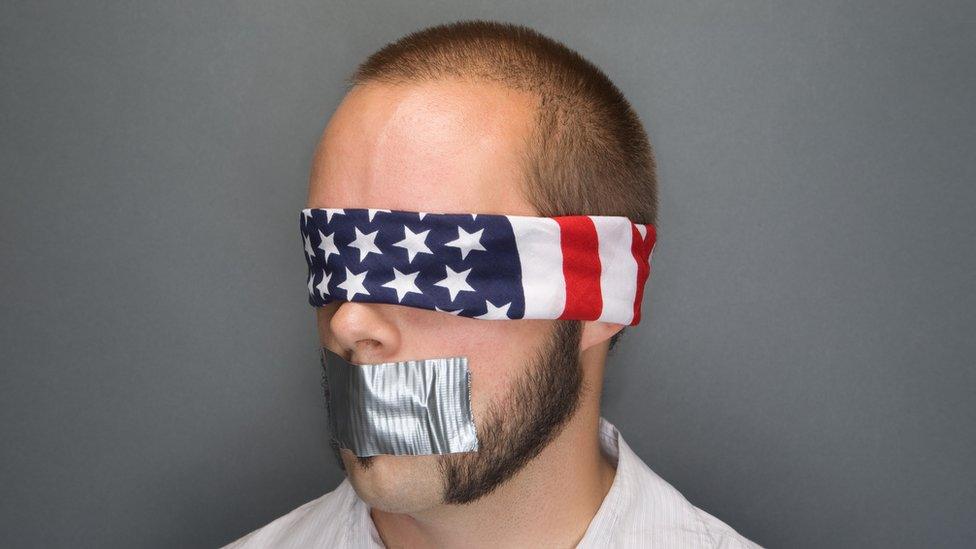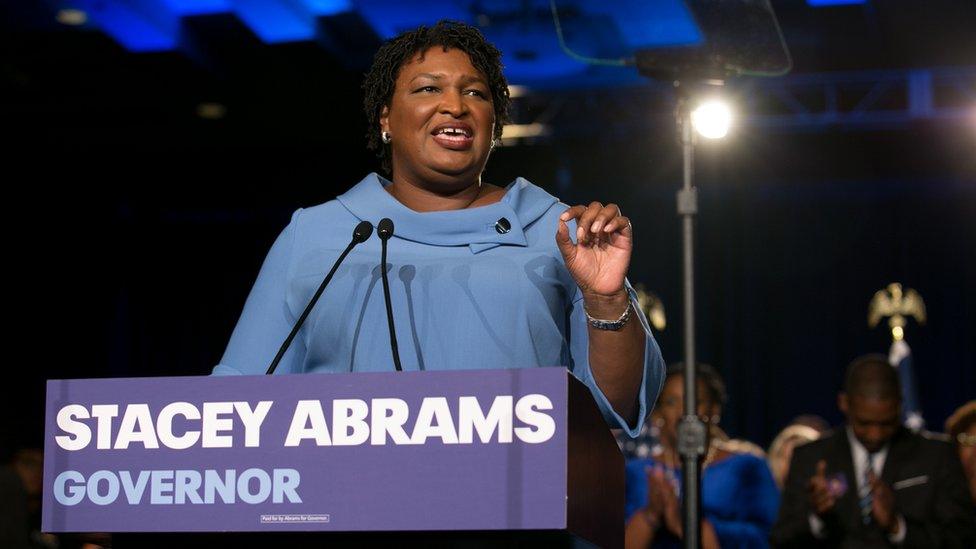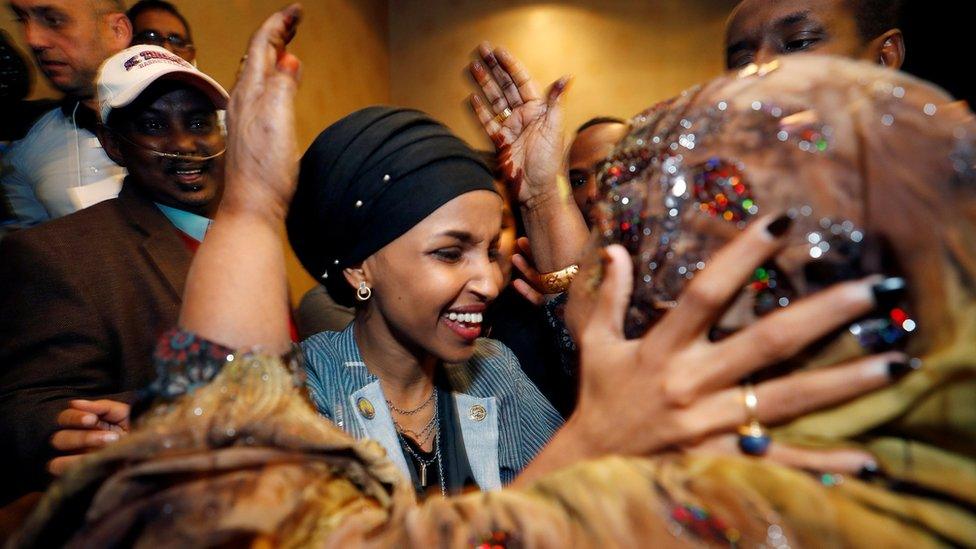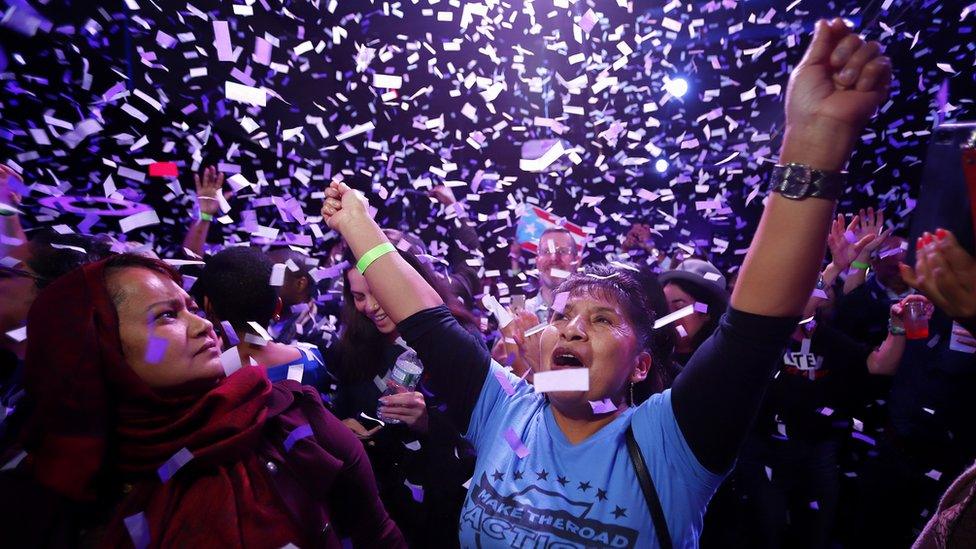Mid-terms 2018: When voting goes wrong
- Published

After celebration of historic wins by diverse candidates, the other big online trend for the US mid-term election was claims of massive and deliberate vote suppression.
Reddit's top post was an unverified video of apparent errors at a ballot machine in Indiana, while reports of hours-long queues, broken ballot machines and intimidation spread on Twitter and Facebook.
A Google map of live election-related searches showed spikes in interest in provisional ballots and long waiting lines across the country.
And in Florida, a church that serves as a polling station was criticised after posting a sign discouraging voters to choose Democrats, reported local media., external
Allow X content?
This article contains content provided by X. We ask for your permission before anything is loaded, as they may be using cookies and other technologies. You may want to read X’s cookie policy, external and privacy policy, external before accepting. To view this content choose ‘accept and continue’.
Some reported cases were simple technical errors. In Ohio, one widely-shared claim of vote rigging turned out to be caused by a temporary paper jam., external
In Georgia, where African-American candidate Stacey Abrams is contesting results in her race against incumbent governor Brian Kemp, many online are claiming that issues like ballot machines supplied without power cords and four-hour queues, external helped boost Mr Kemp to victory.
Mr Kemp was responsible for overseeing his own election, and the National Association for the Advancement of Colored People and the Lawyers' Committee for Civil Rights Under Law won emergency litigation in predominantly black areas of Georgia to extend voting times.
Before the election, 53,000 voter applications were put on hold in Georgia because of alleged problems with identification information.
Allow X content?
This article contains content provided by X. We ask for your permission before anything is loaded, as they may be using cookies and other technologies. You may want to read X’s cookie policy, external and privacy policy, external before accepting. To view this content choose ‘accept and continue’.
Without comprehensive national data about problems like broken ballot machines, it is hard to calculate the full scale of Tuesday's problems, but evidence suggests that alleged vote suppression was more widespread this year than in previous mid-terms.
Calls to the largest non-partisan voter helpline in the country,, external run by the Election Protection Committee, were up by one-third in comparison with 2014, with 31,000 calls on Tuesday.
Purges of voters from electoral rolls are more frequent than in 2010 and there is evidence that the numbers of voters requiring provisional ballots also increased, Vanessa Williamson at the Brookings Institution research group, who has written on the topic, said on Wednesday.

Stacey Abrams is contesting the results in her bid to be Governor of Georgia
Provisional ballots are issued when a voter's eligibility is in question and are often only counted in a close race.
On Wednesday, Senator Dick Durbin of Illinois also accused Republican lawmakers of trying to "make it as hard as possible for people to vote".
Alleged vote suppression and intimidation tends to happen in areas with high African American, Hispanic or poor populations, where their vote could alter the status quo.
"Officials pursue voter suppression tactics to lock out voters of colour with the end goal of distorting electoral outcomes," said Kristen Clarke, president of Lawyers' Committee for Civil Rights Under Law, part of the Election Protection Committee, on Wednesday.
Her organisation tracks alleged voter suppression efforts throughout election cycles and won a lawsuit against Mr Kemp in Georgia in 2016, but nonetheless the scale of claims of problems on Tuesday were "startling", Ms Clarke said.
Georgia, Arizona, Texas and North Dakota, Florida are the front line of their efforts.
Research has previously shown that alleged vote suppression in the form of ID laws, external does not seriously affect election outcomes.
But in places like Georgia, where Mr Kemp may have won the race by fewer than 85,000 votes, it is easy to see why citizens would be concerned that an election was stolen from them.
"In very close races, an enormous number of factors contribute to the margin of difference. But where we are talking about hundreds of thousands of people shunted off the rolls, any reasonable person would be concerned about what that would mean for the validity of election outcomes," Ms Williamson commented.
By Georgina Rannard, UGC & Social News
- Published8 November 2018

- Published7 November 2018
